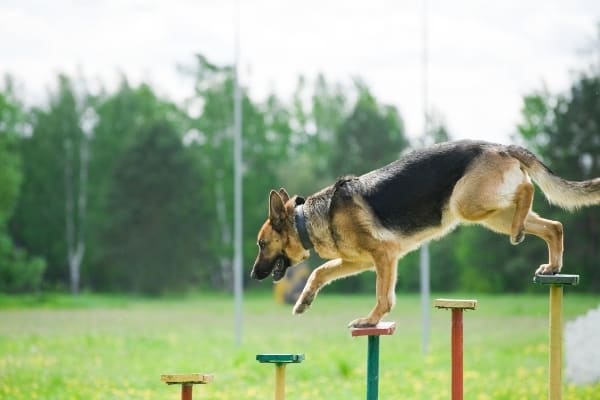Are German Shepherds High Maintenance?
Possibly one of the most easily recognized dog breeds in the world is the German shepherd.
From their trademark colors and markings to their intense and beautiful faces, it’s hard to miss one of these charming dogs.
Shepherds are popular pets because of their intelligence, looks, and loyalty, but they aren’t the right companion for everybody.
If you are contemplating bringing a German shepherd into your home, some thorough research should be done before any final decisions are made.
You may be wondering about grooming, exercise, and food requirements for a shepherd or what their behavior is like.
While German shepherds are definitely not the most high maintenance breed there is, there are a few specific things that can make them require a bit more time and energy than other kinds of dogs.

What Kind of Grooming Maintenance is Necessary For German Shepherd?
A German shepherd’s fur will never exceed a medium length. This means that you save time, effort, and money on trims.
With that being said, their coat is thick, especially in the winter months when it helps to keep them warm.
German shepherds need frequent brushing and grooming to prevent knots and dirt in their fur.
Shepherds’ nails will also need to be regularly filed or clipped so they don’t get too long.
What Health Issues Might German Shepherd Be Prone To?
While German shepherds are typically more active and tough dogs, there’s a relatively lengthy list of problems to look out for in aging ones.
Due to inbreeding and this breed’s size and activity level, shepherds are prone to conditions like hip and elbow dysplasia.
These are malformations in the joints that are very common in many large breeds, but especially in shepherds.
According to PetHelpful, German shepherds are also prone to other health issues including, but not limited to:
- Degenerative Disc Disease
- Bloat
- Epilepsy
- Thyroid Issues
Almost all of these conditions can be spotted early and treated, but treatment doesn’t always have the effects we hope for and can be expensive.

What About German Shepherd Training?
German shepherds are very intelligent dogs. This means that without proper training, their behavior can become overly hyperactive and seem disobedient.
It’s important that training begins in the early stages of a shepherd’s life so that they learn more easily and quickly.
Your German shepherd only wants to make you proud and complete tasks the way you want them done. For this reason, training is a team effort.
Patience and clarity are as mandatory and crucial from you as obedience and focus are from your dog.
But once a German shepherd is trained, that is the set of skills and standard of obedience that they base their behavior on for the rest of their life.
What Is a German Shepherd’s Personality Like?
Just like humans and other breeds of dogs, every shepherd is an individual with his or her own personality.
However, German shepherds are generally fearless and very intelligent.
Because of their tendency to be brave and refuse to back down, training and socialization are extremely important.
Your German shepherd needs to be comfortable around other dogs and humans, including children, to avoid any problematic altercations.
A German Shepherd is also typically on the playful side. This breed can and will spend hours (if allowed) playing and tiring out.
Lastly, German shepherds have a strong prey drive. This means that they love a nice chase and are determined when involved in one.
For this reason, a German shepherd probably wouldn’t be best suited for a house with small pets like hamsters or bunnies.
Playing fetch with a German shepherd is a great way for them to exercise their chase instinct and get some energy out of their system.

How many exercises Does German Shepherd Need?
According to PDSA, German shepherds tend to be very active dogs – that means owners need to be ready with plenty of outlets for that energy.
Scheduled exercise and playtime are important factors in keeping a shepherd healthy, happy, and well-behaved.
Lack of exercise for a German shepherd can lead to behavior like excessive barking, chewing household items and furniture, or even aggression.
Ideally, this breed should get at least two hours of activity a day.
This time could be anything from walking and running to off-leash exercises like fetch or other games.
Since it’s also easy to overwork your dog, it’s a good idea to spread exercise throughout the course of the day.
For anyone who works long hours and would be unable to get these periods of exercise into their schedule, having a hired dog-walker or friend to let your dog run around would be necessary.
This breed loves to work and play with their owner. Their ultimate goal is to make you happy and proud while still having fun.
Training your German shepherd can act as some of their exercises for the day, or you can look into exercises to do together.
In the case of most German shepherds, if they’re worn out, they’re happy.
Do German Shepherd Bark a Lot?
As dogs, German shepherds are naturally going to bark at some things, but how much is normal?
Generally, a well-trained German shepherd will most likely bark less than one with no training.
However, as deeply intelligent and emotional dogs, shepherds can tend to bark more than other breeds.
A German shepherd might bark out of instinct to inform you of a potential intruder, but even the most well-trained and exercised shepherd might still have the occasional random barking fit.
Exact causes can’t always be known, but a shepherd is most likely barking for one of the following reasons:
- Boredom
- Instinct
- Anxiety
- Aggression
If a German shepherd is left home alone for extended amounts of time, he or she is liable to get bored and anxious.
They’re also likely to start barking if they aren’t getting the physical exercise and mental stimulation that they require.
If their mind isn’t being challenged with games and exercise, boredom and barking are sure to shortly follow.
Any dog is also capable of getting frustrated with the dogs or people around it.
Typically, a well-trained and socialized German shepherd will not be prone to barking out of aggression, but everyone gets annoyed sometimes.
It’s important to know when your dog is feeling uncomfortable and remove them from the situation immediately.
What Food Should German Shepherd Eat?
German shepherds can eat a variety of different foods, but because they’re a large and active breed, they have certain caloric and nutrient needs.
A German shepherd should be fed a quality, protein-rich food with all the fats, vitamins, carbohydrates, and calories that they need to stay healthy.
A German shepherd’s food should contain protein from whole meat like fish or beef.
The protein in the food should be the first listed ingredient, because these are listed in order of weight, according to the FDA.
The ideal food for a German shepherd also has sources of grains that are easy for the dog to digest. This includes things like rice and rolled oats, instead of ingredients like corn or soy.
A German shepherd’s diet should be relatively high in calories and carbohydrates to facilitate the level of activity that they typically have.
If the dog isn’t getting this exercise, he can quickly become overweight which will put the dog more at risk for numerous health conditions.

What Is The Overall Cost of Owning a German Shepherd?
Adopting a German shepherd can no-doubt be the less pricy way to go, not to mention the fact that you’re giving a home to a pet in need.
However, if you do choose to buy a German shepherd puppy from a breeder, that is the first cost to take into consideration.
Next on the list are set up costs, the ongoing cost of maintaining the dog, and a few other important costs.
Set up costs are going to include things like vaccines, neutering, and necessary equipment.
Your dog will need things like a collar and leash, tags, food, bowls, brushes, and more.
These things will also need to be replaced as they get old or the dog outgrows them.
Ongoing costs typically include food and preventative vet visits, as well as the replacement of the dog’s initial equipment.
In addition to these, training tools and treats are necessary, as are the occasional boarding costs if you travel.
If you’re someone who works a lot and would need to hire a walker for the dog, that’s another essential.
Is German Shepherd The Right Dog For Me?
German shepherds have the potential to be your very best friend.
In an environment where they receive the proper training, exercise, food, and general care, a German shepherd will be one happy dog.
If you have the necessary time to maintain a shepherd and are willing to put in the work, this could be the breed for you.






























